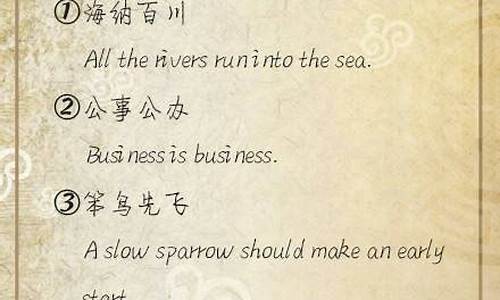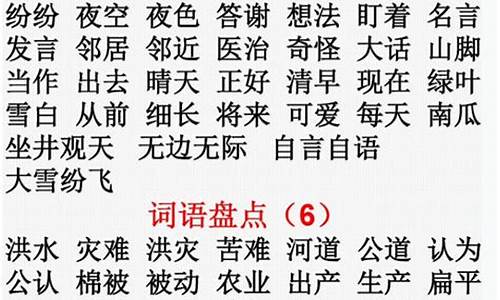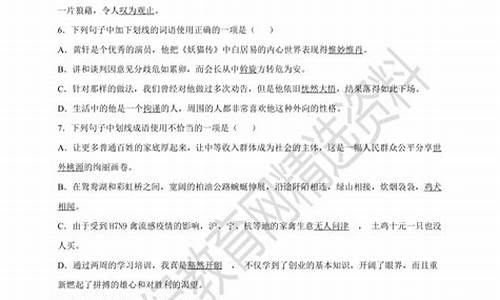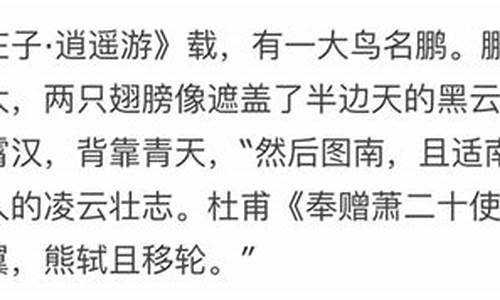您现在的位置是: 首页 > 成语查询 成语查询
成语的英文怎么说_成语的英文怎么说怎么写
ysladmin 2024-06-27 人已围观
简介成语的英文怎么说_成语的英文怎么说怎么写 现在,请允许我来为大家详细解释一下成语的英文怎么说的问题,希望我的回答能够帮助到大家。关于成语的英文怎么说的讨论,我们正式开始。1.成语是怎样翻译为英
现在,请允许我来为大家详细解释一下成语的英文怎么说的问题,希望我的回答能够帮助到大家。关于成语的英文怎么说的讨论,我们正式开始。
1.成语是怎样翻译为英文的?
2.中国成语用英语说(英译汉)
3.几个成语的英文翻译
4.成语的英文翻译
5.中文四字成语的英译及其翻译策略

成语是怎样翻译为英文的?
英文里面有对应说法的,是因为成语和谚语本来描述的就是通常的自然、社会现象或者人类情感,这些中国有外国也有,所以英语里面会有可以准确对应成语谚语的说法。比如:爱屋及乌(Love me, love my dog.)、萝卜青菜各有所爱(One man's meat is another's poison.)、拆东墙补西墙(Rob Peter to pay Paul)。有些英语里面的表述甚至可能更简洁,比如:史无前例(Unprecedentedly),一个词就行了。
中国成语用英语说(英译汉)
“知己知彼,百战不殆”的英文:know the enemy and know yourself, and you can fight a hundred battles with no danger of defeatbattle 读法? 英 [?b?tl]? 美 [?b?tl]?
1、n.战役;战斗;搏斗;较量;争论;斗争;奋斗
2、v.搏斗;奋斗;斗争
例句
1、When the nobles rebelled, the king battled them.
当贵族谋反时,国王便出兵打他们。
2、They tried hard to battle the false doctrine.
他们竭力反对这个虚假的学说。
短语:
1、battle it out?打出胜负,奋力争夺
2、battle field?战场
3、battle line?战线;主战部队
4、battle effectiveness?n. 战斗力
5、losing battle?必败之仗
扩展资料词语用法:
1、battle用作动词的基本意思是“作战”“斗争”,可指战场上真刀真枪地厮杀,也可指意识形态领域中的斗争,用于比喻,可指“努力”“奋斗”。它的主语一般是人、党派等,宾语可以是人,也可以是抽象名词,一般不接具体名词。
2、battle可用作及物动词,接简单宾语; 也可用作不及物动词,接介词against/with表示“对象”(可以是人、物,也可以是抽象事物),接介词for表示“目的”。
3、在美式英语中,?battle还可以表示“反抗”。
词义辨析:
battle, fight, warfare, war, engagement这组词都有“战斗,战争”的意思,其区别是:
1、battle?侧重指战争中的一次较全面、时间较长的战斗,也指陆军或海军在某一特定地区进行的战斗,或个人之间的争斗。
2、fight?最普通用词,含义广,指战斗、斗争或打斗。
3、warfare?侧重指战争状态或具体的作战方法。
4、war?是战争的总称,一般指包括多个战役的大规模战争。
5、engagement?指交战,交火。
几个成语的英文翻译
o(∩_∩)o...是练习上的题目吧?
楼下不得抄袭!!
1.the apple in the hand(囊中之物 )
2.grief and indignation(义愤填膺 )
3.carry sth through to the end( 持之以恒\从一而终)
4.apple—pie order(井井有条 /井然有序)
5.faithfulness(诚心诚意 )
6.let yourself go(放任自流 )
7.the lip rifle(唇枪舌剑 )
8.take advantage of a weak point(趁虚而入)
成语的英文翻译
杯弓蛇影 be jittery with imaginary fears
烈火见真金 Fine gold must be purified in the flaming fire
狐假虎威 sought power by riding the back of the tiger
异曲同工 so differently but can achieve the same effect
集腋成裘 Little and often fills the purse
有眼不识泰山 Entertain an angel unawares.
中文四字成语的英译及其翻译策略
非常高兴能够帮你解答问题,希望能够真心帮助到你,谢谢
愚公移山 ,刻舟求剑
The foolish old man, who removed the mountains. Carve on gunwale of a moving boat。
互相矛盾 。 孟母三迁
Contradictory.Mencius' mother moves her home three times to better her son's education。
看到这个问题,我特意跑去查看了我的英语笔记,现在把它总结一下,分享给你,希望对你有帮助。~成语的英译策略
直译意译套译法加注法①直译: 在不违背译文语言规范、不引起错误联想的前提下,译者在英译汉语成语时可以采用直译法
1)相同的成语:
来得容易,去得快Easy come,easy go
趁热打铁strike while the iron is hot.
2)相近似的成语:
挥金如土spend money like water
破釜沉舟burn one's boats(都源于军事家的策略)
3)隐含意义很明显的成语:
雪中送炭to offer fuel in snowy weather
一人得道,鸡犬升天even the dog swaggers when its master win favour
②意译:意汉语成语具有的民族文化特色在很多情况下载译语中难以用直译法再现,为了确保译文读者准确理解成语的意义,我们常常采用意译手法
不测风云Something unexpected may happen any time
开门见山 come straight to the point
③套泽法:套套用译语中某个与汉语成语相似的成语来进行翻译的方法)
1)两个成语的字面意义和蕴含意义基本一致
浑水摸鱼 fish in troubled water
2) 两个成语的比喻形象有所差异,但比喻意译基本一致。
笑掉大牙 laugh off one's head
4.加注法(在译文中添加读者理解成语所需的文化信息和背景知识,其特点在于技能保留成语的比喻形象和文化蕴含,又能确保译文容易为译语读者所理解接受)
东施效颦 Dongshi imitating Xishi, (Xishi was a famous beauty in the accident kingdom of Yue)
四、结语
通过对以上四字格成语的学习,我们得出,四字格不能简单的采用直译的方法进行翻译,而使应该采取更多元化的方法去翻译出更符合英语习惯的四字格成语,同时在中文上也更加贴近四字格成语所包含的内容。
例题
1.爱屋及乌 Love me, love my dog.
2.百闻不如一见 (眼见为实)Seeing is believing.
3.比上不足比下有余 worse off than some, better off than many; to fall short of the best, but be better than the worst.
4.笨鸟先飞 A slow sparrow should make an early start.
5.不眠之夜 white night
6.不以物喜不以己悲 not pleased by external gains, not saddened by personal losses
7.不遗余力 spare no effort; go all out; do one's best
8.不打不成交 No discord, no concord.
9.拆东墙补西墙 rob Peter to pay Paul
10.辞旧迎新 bid farewell to the old and usher in the new; ring out the old year and ring in the new
11.大事化小,小事化了 try first to make their mistake sound less serious and then to reduce it to nothing at all
12.大开眼界 open one's eyes; broaden one's horizon; be an eye-opener
13.国泰民安 The country flourishes and people live in peace
14.过犹不及 going too far is as bad as not going far enough; beyond is as wrong as falling short; too much is as bad as too little
15.功夫不负有心人 Everything comes to him who waits.
16.好了伤疤忘了疼 once on shore, one prays no more
17.好事不出门恶事传千里 Good news never goes beyond the gate, while bad news spread far and wide.
18.和气生财 Harmony brings wealth.
19.活到老学到老 One is never too old to learn.
20.既往不咎 let bygones be bygones
21.金无足赤,人无完人 Gold can't be pure and man can't be perfect.
22.金玉满堂 Treasures fill the home.
23.脚踏实地 be down-to-earth
24.脚踩两只船 sit on the fence
25.君子之交淡如水 the friendship between gentlemen is as pure as crystal; a hedge between keeps friendship green
26.老生常谈,陈词滥调 cut and dried, cliché,stereotype
27.礼尚往来 Courtesy calls for reciprocity.
28.留得青山在,不怕没柴烧 Where there is life, there is hope.
29.马到成功 achieve immediate victory; win instant success
30.名利双收 gain in both fame and wealth
好了,关于“成语的英文怎么说”的讨论到此结束。希望大家能够更深入地了解“成语的英文怎么说”,并从我的解答中获得一些启示。
上一篇:和帆的成语_帆的成语开头







